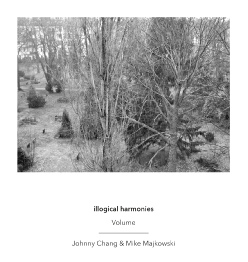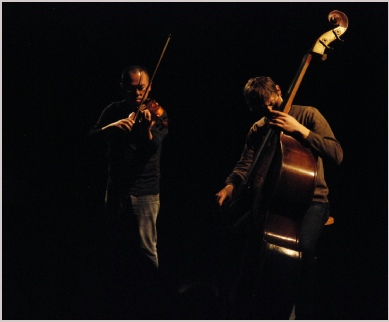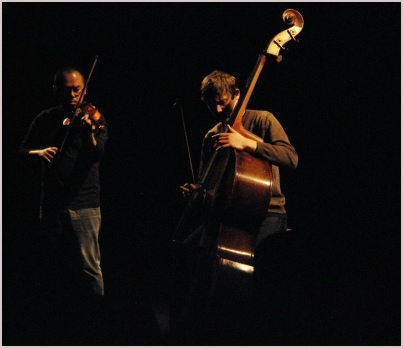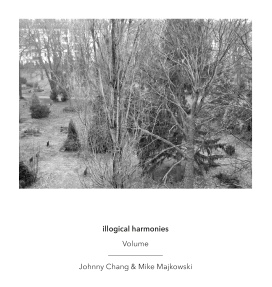Another Timbre TimHarrisonbre

at98 illogical harmonies - ‘Volume’
Johnny Chang (violin) & Mike Majkowski (double bass)
A joint composition in 5 movements, composed and recorded in Berlin, spring to autumn 2015, by Johnny Chang and Mike Majkowski.
Total time: 55:00


Mike Majkowski
Interview with Mike Majkowski
You call your duo 'Illogical Harmonies': what does the name refer to?
Funnily enough,
the name doesn't refer to anything specific! If I remember correctly, Johnny casually
came up with the term during one of our rehearsals, and we both decided it had a
nice 'ring' to it, so we made it our duo name. Since then, we've had quite a few
people come up to us asking about the meaning of the name, and coming up with meanings
themselves, drawing parallels with the music based on their own observations. That's
quite a nice thing in itself, I feel. It's open for interpretation.
Is 'Volume' a
jointly-composed piece? How did it work, and was there a good deal of improvisation
involved in the process?
Yes, it's a jointly composed piece, which grew out of our
practise / recording / listening routine and evolved over the course of several months.
In the beginning, we would improvise pieces (some completely open and others direction-
or time-based with loose guidelines). Everything was recorded and we'd listen back.
Through listening, we'd pick out the most interesting 'moments' or 'movements' or
'sections.' We'd work out what was happening in these 'moments' and transcribe them.
Then we'd treat each of these isolated moments as individual pieces in themselves,
and start the process again: record extended versions of these 'pieces,' listen back,
figure out what the piece needs / what it doesn't need / where it wants to go; refining
the pieces and refining our 'scores' as the pieces evolved. Sometimes we would play
very different versions of these pieces to see how far we could push things (though
we were fine-tuning the pieces through this process, they were still always open
for interpretation). Listening back to the recordings as part of this process revealed
so much. Over time we began to understand the pieces more and more, and we began
combining various sections from various pieces, and a larger structure grew out of
this. In a way, 'Volume' is made up of several sub-pieces, each with a common flavour.
What you describe is obviously a fruitful and distinctive, but also a time-consuming practice. Do you think that the culture of Berlin’s music scene is intrinsic to making such things possible, or could it be done anywhere? And – while we’re on the subject – how have you found Berlin since you moved there from Australia? Has if affected the development of your music?
I use a very similar process in the development of my solo double bass music (recording,
listening, analysing, refining), and this already began before I moved to Berlin.
So I don't think Berlin, specifically, is intrinsic to allowing a time-consuming
practice to unfold. Having said that, I have delved deeper into this form of practice
since living here, as I've been giving myself more time and space to evolve ideas
and process information. This has, in turn, led me into some new musical areas which
I hadn't foreseen. For example, aside from the development of my acoustic pieces,
I've been producing more and more music at home which is largely constructed out
of layered recordings. This has been a new direction that I've been really enjoying,
which organically grew out of this process.
I feel that the more time I spend with
something (an idea, an approach, a sound), the more possibilities it presents to
me. And this creates a sort of feedback loop. New ideas are born out of it and parallel
developments begin to occur. I try to take care to nurture each idea that comes up.
It feels like I'm collaborating with the music I'm making.
Could you describe how you came to collaborate with Johnny Chang, and what appealed
to you about the idea of working with him in a duo context?
We first started playing
together as members of Konzert Minimal, performing Wandelweiser (and related) music.
I joined KM in late 2012 / early 2013. Aside from playing in this group, we would
hang out regularly and discuss music, sharing ideas and observations; the idea to
try something as a duo emerging naturally out of this. The first concept that came
up was two parallel solos (inspired by a concert Johnny played with Lucio Capece,
Hannes Lingens and Koen Nutters - where they performed four collective solos). It
felt like a logical thing for us to try as a duo at the time. This was in 2014. During
our initial rehearsal, we also decided to improvise a bit and record it to see what
it sounded like. Our approach to improvising together was informed by our playing
in Konzert Minimal, and we organically tuned into aspects we focused on in KM, such
as collective listening and duration. Soon enough this felt like the natural thing
for us to do as a duo, and that's what we continued to pursue, and began to develop
pieces together. What appealed to me was a sense of close listening - a trust that
we're both fully aware of the pitches and intonation the other is using at all times,
and working with those details. Also both being interested in deceptively 'simple'
structures - such as sustaining a unison tone, or moving back and forth between two
pitches - and feeling that there is already so much (pitch) material within that
held unison or those two tones.
Yes, the simplicity of structure is one of the beguiling and attractive things about
your CD, I think. But tell us about yourself. What is your background, and how did
you come to experimental music?
I took up the double bass after first hearing Charles
Mingus, whose music and bass playing had a huge impact on me. I went on to study
jazz formally in Sydney, but was always very much interested in non-standardised
forms of jazz, including free-form jazz, and would play such music with like-minded
student friends of mine. Also important to my musical development was studying classical
bass technique + repertoire with one of the principal bassists form the symphony,
and taking private lessons in counterpoint, which I did very diligently for two and
a half years. In parallel to all of this, being interested in discovering other musical
styles which also incorporated improvisation, I became heavily involved with the
improvised-music community in Sydney. Within this community and its regular concert
series, I was exposed to lots of experimental and improvised music (both acoustic
and electronic, as well as electro-acoustic), and met and played with a whole bunch
of musicians from varying musical backgrounds. Not to mention discovering many (new
to me at the time) composers and instrumentalists. I became inspired to seek new
methods of sound production on my instrument, and develop a musical palette on my
own. And it has all progressed from there.
Aside from illogical harmonies, what other musical projects and collaborations are you currently involved in?
The main things I'm involved in at the moment, aside from illogical harmonies, are: two parallel solo projects - one being purely acoustic double bass music, and the other being multi-layered music utilising combinations of various acoustic and non-acoustic sound sources. Then there's 'Lotto' which is a group with guitarist Łukasz Rychlicki and drummer Paweł Szpura. For the past few months, flautist Rebecca Lane and myself have been working on a piece written by Cat Lamb, which is for microtonal bass flute + microtonal double bass. And playing with Konzert Minimal.
Do you have a sense of the direction in which your music is moving, or do you just follow your instincts
without thinking about where you are heading?
In the case of my solo work, I think a lot about where it's heading and what to try next. In the beginning my focus was purely acoustic, and this has evolved into a not-only acoustic approach. During the creative process of producing an album, I do use my instincts, sure, but it's often within the framework of an image I have in mind or a certain atmosphere I wish to convey. Sometimes the visions are concrete, and sometimes they're slightly ambiguous, in which case I will allow for the piece itself (as well as certain sounds) to lead the way. It's nice to balance the two, and there are times where an initial idea can change completely throughout the developmental process. With developing an acoustic piece, I use a process of recording, listening, analysing, writing, recording. until I've refined a structure that I feel is ready for performance. With the multi-layered music, I spend time finding the right sound-sources and the right resonances, as well as processing certain sounds until they feel right to work with. Then I spend time assembling and arranging this material into pieces. In both cases, there is an ongoing process of revision. Sometimes a previous piece or album will provide the basis of inspiration for the next one.
With collaborative projects, each one can have its own approach. It's great to aim towards something together with others, conscientiously developing music, and finding ways of moving forward.

illogical harmonies in performance

Reviews
"Volume" is a collection of five compositions, wrote from improvisations. Mainly constructed on clear structures, with a lot of sustained sounds and a restrained use of pitch and tunes, the Illogical Harmonies duo explore a great attention to timing and duration, as well as interaction between both instruments playing the same tune. There are a lot of mimimal moments here, but also a lot of gracious and cleared melodies in each movements. The duo doesn't explore a large palette of sounds, IH rather explores the capacities of dialogue between two sounds and two instruments (double bass and violin), they explore the nature of pitch, its duration, its texture, its intonation as well as its dynamic, and they explore all that with delicacy, fineness, virtuosity and purity . A great disc by two Konzert Minimal members.”
Julien Heraud, Improv-Sphere
“returning back to the another timbre imprint for further samples from their recently released summer catalogue, this is the quite elegantly demurred autumnal beauty that is ‘volume’ an extract from an extended composition by Johnny Chang and Michael Majkowski, here trading collectively as illogical harmonies, a most alluring example of the bowing weave of violin and double bass whereupon the conversation assumes a graceful stillness as though conducted in some misty twilight forest glade just as nature’s guards change with the night falling away to sleep and the yawn of daydream, a most dedicated and quietly appreciating study of poise, atmosphere and polite interplay. “
Mark Barton, The Sunday Experience
“Volume by the duo Illogical Harmonies on the Another Timbre label clearly identifies itself as a jointly composed piece. The violinist Johnny Chang and double bass player Mike Majkowski improvised together over several months, transcribing, performing and revising until they had sculpted this hour-long suite of five movements. This painstaking process has produced a beautifully restrained and focused performance, which at first sounds like a concentrated study on intonation and tuning but on closer listening reveals beautiful details of refined ornamentation and subtle relief.”
Ben Harper, Boring Like a Drill
“Illogical Harmonies is the name of the Berlin-based duo of violinist Johnny Chang and Australian double bassist Mike Majkowski. The pair have previously released Illogical Harmonies with d'incise (INSUB, 2016), and are both members of the larger ensemble Konzert Minimal which focuses on the music of the Wandelweiser group, of which Chang himself is a member. Of the four discs here, Volume is the only one featuring two stringed instruments. Consequently, it has a sound all of its own, something which Chang and Majkowski fully exploit. Across five joint compositions, varying in length from four-and-a-half minutes to over twenty-two minutes, the two of them play continuously, often both sustaining long notes to create a pleasing drone.
Majkowski's website says "the music of this duo highlights string resonance and illogical harmonies" without further elaborating the meaning of the phrase that the duo employs as its name. That phrase feels like an oxymoron as "illogical" implies "disharmony" while "harmony" implies "logic." The music here does not reveal any harmonies that seem illogical; on the contrary, although some may be uncommon harmonies there seems to be nothing wrong with their logic. Aside from such pedantry, without exception this combination of violin and bass is extremely relaxing and stimulating, owing its success equally to both instruments and being an excellent advertisement for both. Music to return to frequently.”
John Eyles, All About Jazz
Discount price £5